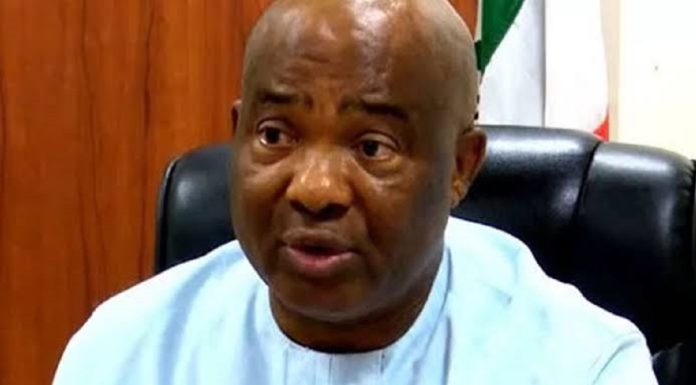It is no longer news that the Supreme Court recently declared Sen. Hope Uzodinma duly elected as the Governor of Imo State in the March 9, 2019 Governorship Election. The historic judgment which many legal pundits have referred to as the greatest judicial abracadabra of all times, sent shock waves across Nigeria and beyond. The reason being that a cursory look at the facts of the case will clearly show any right thinking person that the judgment indeed has ‘k leg’, apologies to former President Olusegun Obasanjo.
The reasons for this is not far-fetched, because one may not need to be an expert in law to see that the decision of the Honourable Justices of the Supreme Court, with all due respect, clearly defies both logic and law. It is hard to believe and difficult to understand how the Supreme Court ruled that Hon. Uche Nwosu was the rightful candidate of the All Progressives Congress (APC) at the guber election, but disqualified him for double nomination in another party, the Action Alliance (AA).
Only for the same Supreme Court to do a volte face by declaring Sen. Uzodinma elected as Governor on the platform of the APC, in an election he was never a candidate of any party. The implication is that the APC fielded two candidates in the same election for the same position. How can we justify and explain this?
Again, it is trite law that the Supreme Court has no powers to neither increase nor allocate votes to any candidate as decided in the Bauchi State guber case. However, one can not find any logical nor legal explanation as to why in the Imo guber case, the same Supreme Court allocated additional 213, 695 votes to the 96, 458 Sen. Uzodinma scored at the election. The addition of these votes brought the total number of valid votes cast to 928, 050 from the initial figure of 714, 355.
Whereas the total number of accredited voters as published by the Independent National Electoral Commission (INEC) was 823, 743. It is also trite law that the Supreme Court doesn’t have powers to increase the number of accredited voters in any election. So what is the explanation for the excess 104, 307 votes? What is the legal status of the excess votes?
Based on the foregoing, it has become abundantly clear that the judgment of the Supreme Court has left more questions than answers. Otherwise how can one explain the fact that the Supreme Court declared winner, a person it earlier declared was not a candidate in the election? Isn’t that absurd and inexplicably ridiculous? Even a little child can easily understand that someone that was never a candidate, can not be a winner of an election he was not a candidate.
Furthermore, the admission of results from 388 polling units tendered by a Deputy Commissioner of Police, leaves more to be desired, because there is neither logic nor law backing such a decision, since the Nigerian Police has no powers to organize elections. The law clearly states that it is the duty of the petitioner to produce the INEC officers who made the results to tender and defend it at the court. As a matter of fact, results tendered by a police officer are not admissible in an election matter because police officers are not INEC officials. In this case, this law was not complied with, so on what grounds where the said 388 results admitted?
In fact, they said election was held in the 27 local government areas, 305 wards and 3,523 polling units in Imo state, but INEC cancelled results from 252 units and excluded those from 388 units. Taking a deeper look at the logic behind the allocation of votes by the Supreme Court in this case, how best can one explain the fact that Sen. Uzodinma polled a paltry 96, 458 votes from 2,883 polling units, and ‘magically’ garnered a massive 213, 695 votes from just 388 polling units? This also defies mathematical logic and further leaves one with more questions than answers.
Normally, a sound judgment by the apex court is meant to resolve issues and lay matters to rest. Sadly, howbeit, surprisingly, it appears the judgment of the hallowed Supreme Court in this case has left the public more bemused and confused than they were before the judgment. As a result, legal pundits believe that the very conspicuous grey areas in this judgment has punctured the fabled impartiality and integrity of the Supreme Court. It is for these reasons that Imolites, Nigerians and indeed the international community cried out that the judgment is simply a daylight robbery and a monumental embarrassment to the Nigerian Judiciary.
Consequently, many believe that this portends a bad omen for the continual peaceful existence and unity of Nigerians as it seems that the Judiciary which hitherto had been considered the hope of the common man is no longer so. For when a country degenerates to the point where injustice becomes institutionalized and the credibility of the Judiciary seemingly eroded by political encroachment, the people may resort to self-help and anarchy may ensue.
Nevertheless, the recent petition by Rt. Hon Emeka Ihedioha and the Peoples Democratic Party (PDP) calling for a review of the judgment has offered the President Muhammadu Buhari and APC led Federal Government a second chance to redeem the already battered image of the country and restore the integrity and the fast diminishing respect for the Supreme Court of Nigeria.







